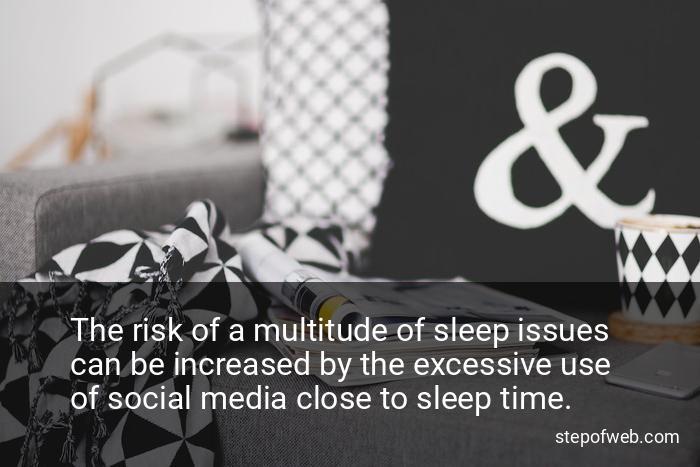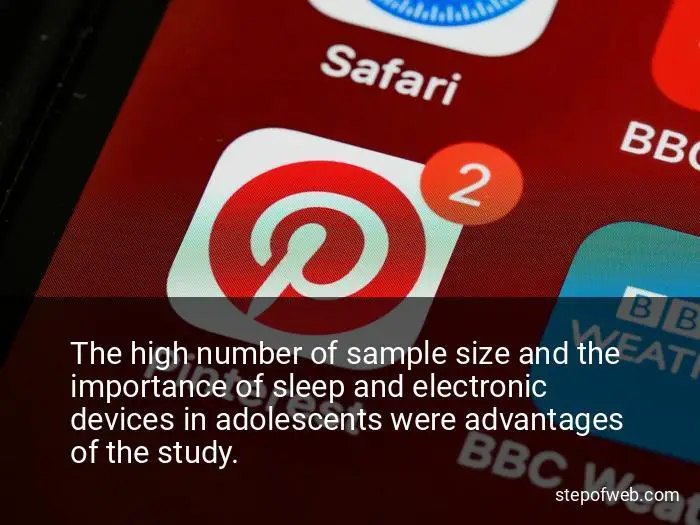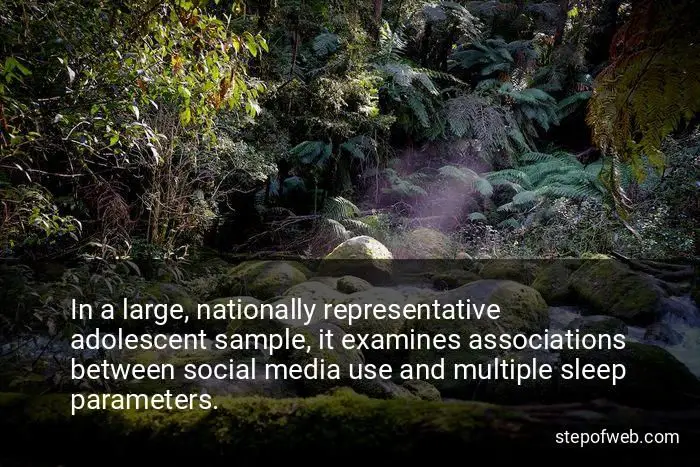How long and how well you sleep can be affected by how you use social media. It's difficult to fall asleep when you look at social media in bed. It can make you feel sleepy the next day.
Social media use can affect sleep in a number of ways, but it may be particularly important before bed for three reasons: social media can affect sleep in a number of ways, but it may be especially important before bed for three reasons:mental activation can hinder ease of falling asleep, the light
The risk of a multitude of sleep issues can be increased by the excessive use of social media close to sleep time.

Why is it important to check social media? It is important to be intentional in creating good social media habits because checking social media is so easy. Take control of your social media and make sure it doesn't affect your sleep.
How to resist social media. Keeping your phone and computer in a different room is one of the best ways to not check social media while you sleep. If you can keep electronics in the office or kitchen, you won't have to sacrifice sleep.
How often do people check social media? Whether it is to find information, chat, or share pictures, most Americans check their social media at least once a day. Social media and sleep are incompatible.
Make yourself feel good. While connecting with others through social media can be beneficial, we all need a break. If you want to give yourself screen-free time every day, you need to practice it.
The high number of sample size and the importance of sleep and electronic devices in adolescents were advantages of the study.

In the analysis for determining the relationship between the amount of social media use and sleep quality and total sleep disorder, it was found that adolescents with poor sleep quality used social media more often.
There is a correlation between average use of electronic devices and sleep duration and there is a correlation between average use of social media and depression. The higher the hours of use of social media, the better the sleep disorder score.
The relationship between electronic devices use and sleep pattern in adolescents was assessed in this study. The amount of social media use by boys was more than that of girls and poor sleep quality had a significant relationship with it.
The relationship between poor sleep quality and a high amount of social media use was found to be statistically significant. In their study, they found that problematic internet users were at a higher risk of sleep problems and recommended that they improve their sleep habits.
In a large, nationally representative adolescent sample, it examines associations between social media use and multiple sleep parameters.

It is important to assess the practical significance of underlying direct effects and to identify which aspects of adolescent sleep merit attention to social media use. There are statistically significant associations between social media use and sleep. The findings show an association between social media use and sleep.
When controlling for: age and sex, sociodemographic measures and sleep hygiene behaviours, previous studies have found a significant association between social media use and measures of sleep disturbance. In addition to providing much-needed UK evidence, the current approach also addresses the need for evidence that examines social media specifically, rather than generic screentime.
Considering previous and current findings, this suggests that adolescents who spend more time on social media do tend to take longer to fall asleep, with depression and anxiety associated with both poor sleep quality and social media use.
Screen use at night can lead to poor sleep quality if you use electronic devices to interact on social media.
Teenagers who use social media frequently are more likely to wake up early.
The harmful effects of social media on sleep may be mitigated or prevented by a sleep environment that encourages healthy social media habits. It is possible to develop healthy social media habits that will encourage a better night's sleep by learning about how social media could be impacting your sleep.
Teens who use social media have a harder time sleeping. A growing body of research shows that electronic devices and social media use can affect sleep health in children and teenagers. Social media users may benefit from changing their sleep habits.
Teenagers that use social media frequently are at risk of waking up too early and may not be able to sleep. Initial research shows that there is an association between social media use and sleep problems.
Some of us may not realize that using a smartphone at night can sabotage healthy sleep.
- How to help sleep better. A 2020 study suggests that limiting screen time before the sun goes down may help support healthy sleep by increasing time spent asleep and reducing nighttime alertness. Better mood and working memory can be achieved by less screen time. Blue light exposure from screens should be limited to at least two hours before sleeping. On your phone's settings, you can set limits on the number of apps that can be accessed at a given time.
- Wind down in the evening. The same goes for sleep habits. Creating practices that lead to better sleep habits is something to consider. Take a warm shower, listen to relaxing music, brush your teeth, do your skincare regimen, enjoy light yoga and other relaxing activities that don't involve your smart device, if you want to arrange these winding-down activities in the order that suits you. Instead of spending most of your time on your phone, you will be able to focus on the activity list.
Some of us don't know that using a phone at night can cause sleep problems. The impact on sleep quality and overall well-being cannot be overlooked, even though using your smart devices at night may seem like a harmless habit.
The timing of our sleep-wake patterns can be affected by this and it can also negatively impact daytime energy. It is possible to disrupt your sleep quality by using your phone at night. Smart devices and social media apps keep us connected.
If you use some of the ideas listed above, you may be able to get a good night's sleep. The evening is a good time to get your mind and body ready to sleep. You will likely miss out on good sleep for that night because you will likely delay sleep for later.
If you can resist the urge to check social media one last time before bed, there are ways to build healthy nighttime habits and reduce social media use before bed.
Teenagers who were very high social-media users were 70% more likely to fall asleep late on school nights and after midnight on other days than average users.
- Teenagers are more likely to go to bed after 23:00 if they use social media for more than three hours a day.
Teenagers are more likely to go to bed after 23:00 if they use social media for more than three hours a day. There is a theory that time spent on social media is reducing the amount of sleep teenagers are getting.
Teenagers may be lying awake because they are not ready to fall asleep or disengage from social media because they don't want to miss out. Girls are more likely to spend more time on social media than boys.
to 15 year-olds may be delayed in getting to sleep because they are on their phones. They were asked how much time they spent on social networking, messaging sites and apps on a typical school day and at weekends.
Many teenagers want to go to sleep later and wake up later because of the short supply of sleep at this age.
→ The origins of social media in the late 90s
Too much social media isn’t just tied to sleep loss.
Sleep loss is tied to too much social media. Social media can affect sleep. Delayed sleep and wake times were tied to more social media usage. Adults who check social media 30 minutes before bed are more likely to have sleep problems, according to an Oxford study.
Increased odds of sleep disturbances were tied to higher volume and frequencies of social media use. When it comes to how social media affects sleep, there is evidence of a psychological component. The better sleep quality was related to better sleep quality during the evening.
Compared to peers who spent less time on social media, participants who spent the most time on it had twice the risk of sleep problems.
Young adults who spend a lot of time on social media during the day or check it frequently throughout the week are more likely to suffer sleep problems than their peers who use social media less.
The participants who reported most frequently checking social media throughout the week had more sleep problems than those who checked less often. Many forms of social media involve interactive screen time that is stimulating and rewarding and could be detrimental to sleep.
It looks at the relationship between social media use and sleep among young adults who are the first generation to grow up with social media. Increased use of social media may lead to more sleeping problems. Social media can be used by young adults who have trouble sleeping to pass the time.
The bright light emitted by the devices used to access social media accounts is disrupting the rhythms of the human body.
This study addresses the knowledge gap by investigating the associations of psychological well-being and sleep hygiene with problematic sleep adults.
According to research, fear of missing out on social media may affect sleep and quality of sleep. In two groups of young adults, FoMO was an indirect predictor of problematic sleep. The study looked at the issue of sleep problems due to social media use.
Compulsive social media use and sleep hygiene can affect sleep. There are associations between the fear of missing out and psychological well-being. The need for interventions to reduce the impact of social media on sleep has been found. There were significant differences between the two groups.
FoMO is more associated with working professionals than it is with other groups.
→ Which social media platform is most popular among doctors?
Social media usage around bedtime can have major repercussions for your sleep.
- Sleep better when you are on social media. It is possible to improve your sleep quality by reducing your exposure to social media. If you want to wind-down your usage in time for bed, aim to do so at least 30 minutes before you go to sleep. Screen-free time will help prepare you for sleep, instead of scrolling through your phone.
- Blue light affect sleep. It tells us to prepare for sleep and wind down. Your melatonin levels are affected more by the blue light emitted by mobile phones. melatonin production is suppressed and sleep becomes delayed because it signals to your brain that it is daylight.
- Keep your phone from waking up at night. If you want to avoid this, turn off your phone, put it in airplane mode, or leave it silent. If it feels like a step too far, leave it on the far side of the room, away from your bed.
- Sleep deprivation affect health. There are many different ways sleep deprivation can affect your health. The team at Sleepstation can provide you with the tools you need to get a good night's sleep, if you feel like you are struggling toDisconnect and your sleep is being compromised.
Each participant was asked to wear a smartwatch to record how long it took to fall asleep and the amount of time spent in the REM phase of the sleep cycle, as well as give feedback on how tired they felt the next morning after using their designated app.
TikTok had the biggest impact, with those who spent their pre-sleep time scrolling through their feed ending up spending less than half of their REM sleep. If you switch to dark mode in your apps, you can reduce the blue light emission from your phone screen.
It's recommended that you don't use electronics for at least two hours before you sleep. In order to find out which apps have the biggest impact on their sleep patterns, the team from Sleep Junkie surveyed 2,012 Americans, the majority of which regularly use their phones before sleeping.
You can read the full report from Sleep Junkie here. It's a good time to change evening phone habits. It may not be as relaxing as you think, but many see it as a way to relax after work.
→ The impact of social media on communication
Social media is a big part of many teens' lives.
- Does social media cause anxiety? A number of studies have shown a correlation between high levels of social media use and depression. A 2016 study of more than 450 teens found that teens who spent more time on social media had worse sleep and higher levels of anxiety and depression.
- Why is social media important for teens? Teens can use social media to build networks and create online identities. Teens can receive valuable support from these networks. Teens use social media.
A big part of the lives of teens is using social media. Ask your teen how social media makes him or her feel and how he or she uses it. Discuss with your teen how to keep social media out of his or her life.
Teens can be negatively affected by social media use, such as being distracted, disrupting their sleep and being exposed to unrealistic views of other people's lives. Teens use a lot of social media.
It's possible that social media can help teens avoid depression by providing a meaningful connection to peers and a wide network of friends.
Teens who use technology in the bedroom suffer from sleep problems and they report worse sleep when they have a television or small screen.
Why is screen time important for teens? Limit evening screen time in children and adolescents to prevent sleep issues. Teens may eat screen time into sleep time. Social media 6 and engaging in exciting or violent content before bed can increase the amount of sleep you can get.
Passive technology such as a television in the background or a phone that emits light can affect melatonin levels.
How much sleep do teens need? Keeping in mind that teens need eight to ten hours of sleep, choose an age-appropriate night time. When possible, encourage your teen to reduce screen use earlier in the day if you agree on a screen curfew. Outside of the teen's bedroom is the ideal location to charge the phones.
Teens have problems with their peers. Problems with mood, emotion and academic performance can be caused by sleep deprivation during adolescence. Teens who don't sleep well are more likely to have problems with their peers and can lead to depression and suicidal thoughts.
Why is blue light bad for kids? Children and adolescents may be extra sensitive to blue light because of their eyes, so limiting evening screen time is important.
Sleep deprived teens were more likely to be disrupted at night with a higher prevalence of computers.
- Why is sleep deprivation bad? The link between sleep deprivation and physical problems is well known. The use of screens, cell phones, Internet and social media have been associated with changes.
- Does social media affect sleep? A reduction in sleep time during the school week is associated with access to social media and especially a cell phone in teenagers' bedrooms, which can have a negative effect on daily functioning and mood.
The study was about the effects of social media on sleep. Modification of sleep behaviors in teenagers has been observed over the past 30 years, with a reduction in overall sleep time and an increase in teenagers suffering from sleep deprivation.
Teenagers from 6th to 9th grade were invited to complete an online questionnaire on sleep habits with teacher supervision and parental consent, as part of a sleep education program conducted in middle schools. Difficulties falling asleep were reported with 33 percent in sleep deprived teens compared to teens who slept.
Difficulties getting up in the morning were more common than taking over an hour to fall asleep. Teenagers who didn't get enough sleep were more likely to report a need to fight their sleepiness.
During the day, the energy was reduced by 6.212.86 vs In sleep, teenagers were deprived of sleep and had a negative effect on their moods.
Modifications in sleep and evening use of screens has been shown to increase teenage sleep time, so education about use of social media and sleep for teenagers needs to start early.
A reduction in sleep time during the school week is associated with access to social media and especially a cell phone in teenagers' bedrooms. For students in 6th grade compared to 9th grade in sleep duration in SP decreased (8:55±90 vs. Sleeping duration was stable (10h08118 vs. sleeping duration of :2593; P0.0001).
There was no difference in sleep duration, sleep quality or performance between girls and boys. Social media and sleep have not been fully explored.
